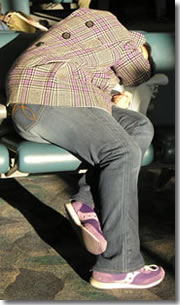- Places
- Plans
- Itineraries
- Experiences

Getting as much sleep as you can on the plane (or even in the airport) is vital to overcoming jet lag when you arrive.
Everyone and their guidebook has a homespun remedy for overcoming the inevitable jet lag that occurs when you land in Rome and your watch says 7am but your body says 1am (the fact that you managed to do no more than doze fitfully on the plane ride over doesn't help).
I don't go in for all that jazz about melatonin—no, not the stuff in your skin than makes you look tanned, but a hormone that's naturally released by your pineal gland at bedtime and that helps regulate sleep cycles. It is now sold in pill form as a sort of natural sleeping pill and body clock-resetting device.
If you're convinced—and overcoming jet lag is 50% attitude anyway, so whatever you think works best does tend to work—ask your doctor about it. If it works, drop me a line and maybe I'll give it a go and change my mind.
(There's also a homeopathic pill called, inspirationally, No-Jet-Lag, which is sold over the counter.)
Then again, some people never feel jet leg. These people deserve a beating. More practical, though, would be to make them carry your stuff for the first few days around town while they're chipper and you're still zonkered.
Share this page
Search ReidsItaly.com